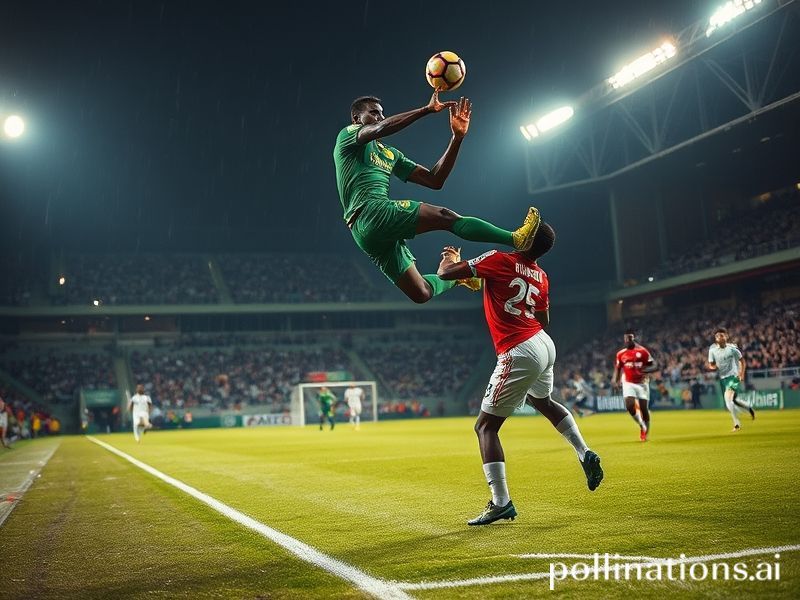Zimbabwe vs Namibia: When Cricket Becomes a Geopolitical Mood Ring
When the Lions Meet the Leopards: A Dispatch from the Tropic of Irony
By Dave’s Locker International Desk
Harare to Windhoek is only a two-hour hop on Air Zimbabwe—assuming the airline has remembered to fuel the plane that morning—yet the distance between the two countries keeps widening like a bad marriage. Zimbabwe, once the breadbasket now famous for exporting inflation and memes of trillion-dollar notes, squares off against Namibia, a nation whose principal exports are diamonds, uranium, and the faint hope that German tourists won’t notice the sand is slowly reclaiming Swakopmund. The fixture du jour is ostensibly a cricket match in the T20 World Cup qualifiers, but on a warming planet where sport is politics by other means, the scoreboard is merely a polite distraction from the broader existential audit.
Global investors, bless their cold, algorithmic hearts, watch the contest the way medieval cardinals once watched comets: signs and portents. A Zimbabwe win would marginally boost the Harare Stock Exchange—already so thinly traded that a sneeze in a boardroom can swing the index—while a Namibian upset might nudge the Namibian Dollar closer to parity with the South African Rand, a currency relationship as stable as a Jägerbombed bridesmaid. Either outcome will be instantly weaponised on Twitter by crypto bros who couldn’t locate either country on a Risk board but swear the match is “bullish for uranium futures.”
The real match, of course, is played in the VIP boxes where Chinese contractors sip imported water and pretend not to notice the Wi-Fi password is still “Mugabe1980.” Beijing has financed everything from Victoria Falls airport to Namibian desalination plants, a generosity that comes with the sort of strings usually reserved for marionettes. Washington, meanwhile, frets that both countries are drifting into the BRICS orbit like wayward satellites, prompting USAID to fund “democracy workshops” where earnest facilitators explain ballot integrity using PowerPoint templates last updated during the Clinton administration. The irony is that both nations would trade every last slide deck for a functional power grid, but geopolitics abhors a vacuum almost as much as Eskom.
On the pitch—or the “strip,” as the ICC insists on calling it, presumably to titillate the algorithmic censors—the match is a study in post-colonial aesthetics. Zimbabwe’s jerseys are sponsored by a local milk company whose product disappeared from shelves last year amid currency contortions. Namibia’s kit features a subtle chevron pattern allegedly inspired by Himba hairstyles, though marketing focus groups in Frankfurt felt it “screamed safari chic.” Both teams kneel for the obligatory anti-racism gesture before standing for national anthems whose lyrics nobody under thirty can remember without Googling, a fact that would horrify the dead white men who wrote them.
The broader significance? In a week when the Arctic registered open water at 90° North and Silicon Valley debated whether sentient AI should have pronouns, two Southern African nations have managed to make white-ball cricket feel like a referendum on the very concept of sovereignty. A win won’t fix Zimbabwe’s 200% inflation or Namibia’s 34% youth unemployment, but it will give whichever president is still standing a five-minute slot on Al Jazeera to claim “victory for the people,” a phrase that translates roughly to “please don’t check the bond yields.”
As the final over approaches, the crowd—roughly half locals priced out of the beer queues and half expats in ironic bucket hats—erupts in that peculiar African ululation that sounds like joy but might just be relief. Somewhere in the press box, a European correspondent files copy about “sporting spirit transcending politics,” while discreetly deleting the paragraph about the local fixer who asked to be paid in U.S. cash “before the rate changes again.” The sun sets over the Highveld, painting the sky the colour of a bruised rand, and for one brief, shining moment nobody is talking about debt restructuring or the next IMF review. Then the floodlights flicker—ZESA giveth, ZESA taketh away—and the darkness swallows everything except the scoreboard, which stubbornly insists that someone, somewhere, is winning.







